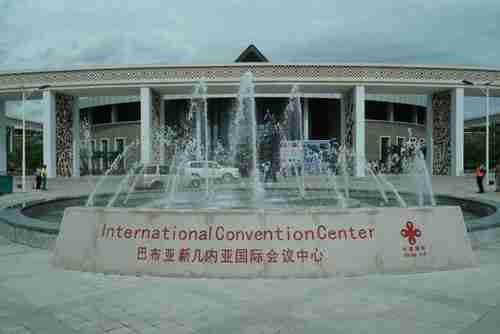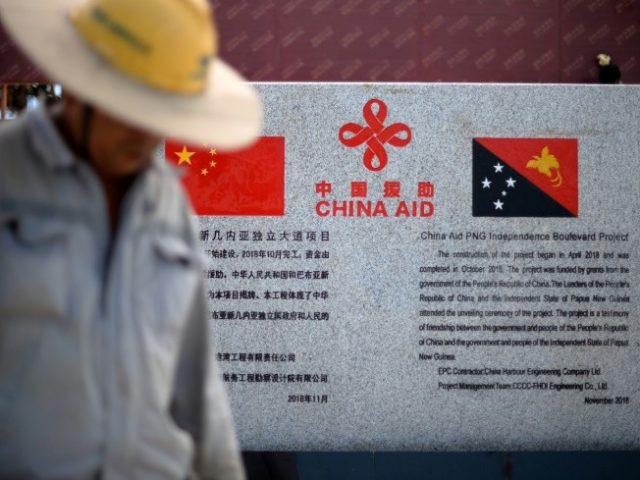This morning’s key headlines from GenerationalDynamics.com
- 500 U.S. marines and other foreign troops arrive in PNG for APEC meeting
- China-Australia tensions high at APEC, after Australia’s ‘pivot to the Pacific’
500 U.S. marines and other foreign troops arrive in PNG for APEC meeting

The new Port Moresby International Convention Center, which will host the APEC summit, was built with Chinese aid money.
The USS Green Bay amphibious transport dock ship arrived in Port Moresby, the capital city of Papua New Guinea (PNG), on Wednesday, with 500 U.S. Marines and U.S. Navy servicemen to provide security and support for the Asia-Pacific Economic Cooperation (APEC) Leaders’ Summit being held this week.
About 4,000 military personnel, around half of them foreign, will work with hundreds of police to patrol Port Moresby for APEC, which will attract representatives from 21 nations.
There is a 1,500-strong Australian Defense Force (ADF) contingent along with RAAF F/A-18 Super Hornet fighters, surveillance aircraft and a helicopter carrier moored in Port Moresby harbor. Vessels from Australia, New Zealand, and the U.S. will guard the capital’s shores, and all three countries have provided special forces. Working alongside them in an operation that has taken more than a year to plan will be about 2,000 Papua New Guinea (PNG) troops.
Much of the summit will take place in a $35 million convention center built with Chinese aid and Beijing has donated nine fire engines, along with 50 coaches and 35 minibusses for use at the event. Chinese troops were excluded from the security forces.
Papua New Guinea (PNG) is an island nation near Australia, which provides it regularly with substantial aid. All of this security is considered necessary because PNG is one of the poorest, most corrupt, and most dangerous countries in the world. Feared street gangs known as “raskols” have made car jackings common and the country has among the highest rates of rape and domestic violence in the world. PNG has a population of 8 million speaking 800 distinct languages and spread out across some 600 islands. With 15,000 delegates expected at the summit, security is essential. And due to a lack of hotel accommodations, many will sleep in the three cruise liners docked at the port.
In view of the corruption, poverty, and street violence, many people are concerned that PNG will not be able to pull this summit meeting off. It is hoped that the massive influx of troops from the U.S., Australia, and New Zealand, as well as support from other countries, will make the meeting a success.
Asia-Pacific Economic Cooperation, or APEC, is a forum for facilitating economic growth, cooperation, trade, and investment in the Asia-Pacific region. The 21 members are the United States, Australia, Brunei Darussalam, Canada, Chile, China, Hong Kong, Indonesia, Japan, Malaysia, Mexico, New Zealand, Papua New Guinea, Peru, Philippines, Russia, Singapore, South Korea, Taiwan, Thailand, and Vietnam.
Donald Trump will not be attending the conference, much to the relief, according to some reports, of the summit organizers. Instead, Mike Pence will be representing the United States. Stars and Stripes and Asia Pacific Report and AFP and Guardian (London)
China-Australia tensions high at APEC after Australia’s ‘pivot to the Pacific’
Despite PNG’s weak economy, high unemployment, corruption, and street violence, China still has considerable interest in PNG’s vast swathes of timber and huge mineral, oil, and gas deposits, which China is looking to exploit.
China’s investments in the region as part of its Belt and Road Initiative (BRI) grew to $2.46 billion in the last year alone for infrastructure projects such as roads and seaports.
Australia has become alarmed by this incursion into its sphere of influence. As a result, Prime Minister Scott Morrison is announcing a new “Pivot to the Pacific” program, where Australia will provide grants and long-term loans for $2 billion for “high priority” projects, including telecommunications, energy, transport, and water.
Morrison said: “Australia has an abiding interest in a Southwest Pacific that is secure strategically, stable economically and sovereign politically. This is not just our region, or our neighborhood. It’s our home.”
This announcement infuriated the Chinese, who must see it as a threat to their unimpeded access to the region’s resources that China wishes to exploit. China’s vice foreign minister Zheng Zeguang issued a harsh response, accusing Australia of a “cold war mentality”:
The Pacific Island region is not a sphere of influence of any country.
[Australia should] objectively look at the relations between China and the Pacific Island countries and to abandon Cold War mentality and the zero-sum game mentality, which are both outdated.
…
Other countries should not obstruct China’s friendly cooperation and exchanges with the island nations. Of course, they have no way to obstruct this cooperation and these exchanges.
The government of PNG says that it has no intention at all of choosing one of China or Australia over the other. It also says that it is ready to accept aid and donations from all sides.
PNG’s prime minister Peter O’Neill says that he is willing to play peacemaker at the APEC summit. “It’s not for me to address either of those countries through the media as to what they should do, but as I have said, for us, they are great friends of this country. So we will do all we can to ensure, if we can, that there are no conflicts, to the extent possible,” he said. Australian Broadcasting and South China Morning Post (Hong Kong) and Australian Broadcasting (8-Nov) and Time
Related Articles
- Australia passes foreign influence laws, targeting China (29-Jun-2018)
- Australia-China relations in crisis after revelation of Chinese bribery scandal (24-May-2018)
- New book documents extensive Chinese infiltration into Australia’s organizations (26-Feb-2018)
- Concerns grow over China’s covert infiltration into New Zealand’s government (16-Feb-2018)
- China-Australia relations plummet over China’s illegal militarization of South China Sea (16-Dec-2017)
KEYS: Generational Dynamics, Papua New Guinea, PNG, China, Australia, Asia-Pacific Economic Cooperation Leaders’ Summit, APEC, USS Green Bay, Australian Defence Force, ADF, New Zealand, Belt and Road Initiative, BRI, Zheng Zeguang, Peter O’Neill
Permanent web link to this article
Receive daily World View columns by e-mail

COMMENTS
Please let us know if you're having issues with commenting.